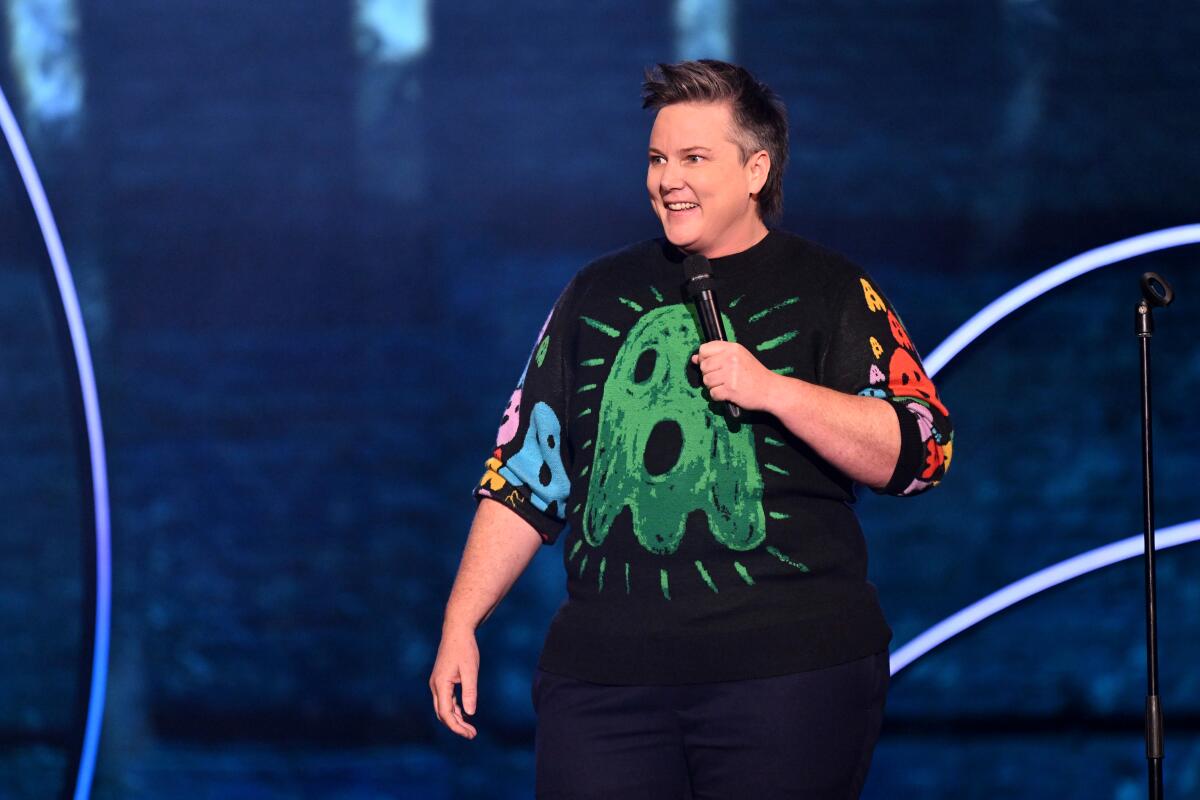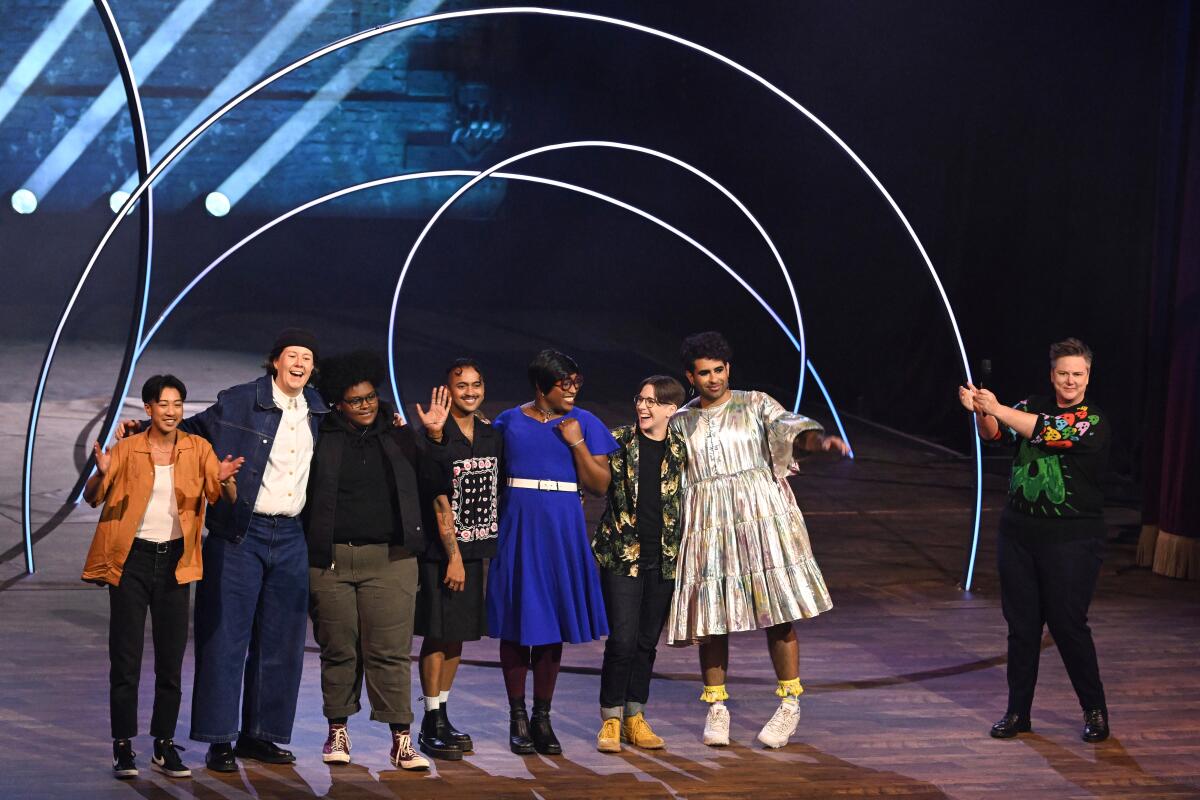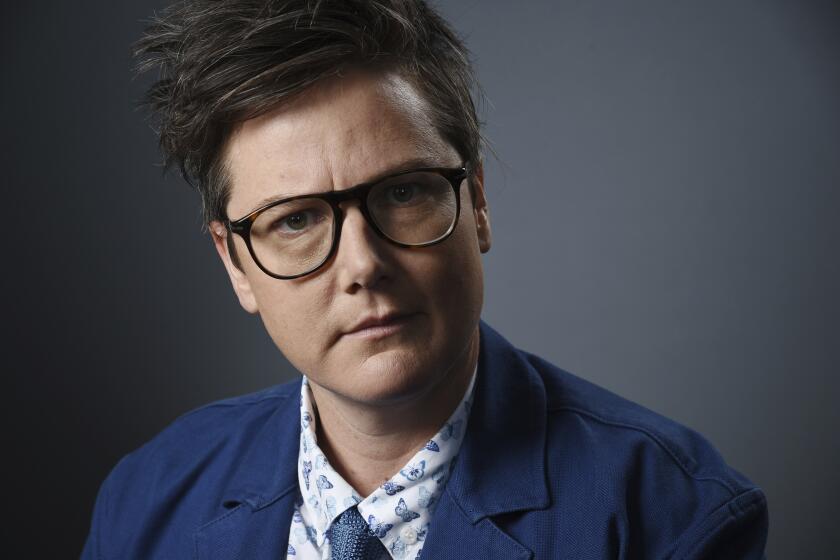With ‘Gender Agenda,’ Hannah Gadsby turns criticism of Netflix into platform for LGBTQ+ comics

- Share via
With the arrival of “Hannah Gadsby’s Gender Agenda,” the battle of Gadsby versus Netflix is officially on pause. “The last time Netflix brought this many trans people together, it was for a protest. So, progress!” the comedian jokes in the trailer for the new special, premiering Tuesday.
Now three specials deep — “Nanette,” “Douglas” and “Something Special” — Gadsby knows that in order to change the tone of a conversation, you first have to be willing to participate. So with this latest offering, Gadsby plays ringleader while showcasing incredible genderqueer comedic talent from all over the globe. Curated by Gadsby and taking place at the iconic Alexandra Palace Theatre in London, “Gender Agenda” features sets by Jes Tom, Asha Ward, Chloe Petts, Alok, Mx. Dahlia Belle, Krishna Istha, as well as a weird little guy, DeAnne Smith. (Calm down, it’s cool.)
The performers in this thoughtfully crafted group are all pros, so they’re right at home telling stories through jokes about topics like slurs, failing, being hot and gay, being a masculine lesbian, having fun with gender, rebranding anxiety, testosterone side effects, and there’s even a discussion on a baggage movement that we fully stand behind. Teaching, learning, laughing — they all identify as funny on that stage. Of the very variety.
“Gender Agenda” isn’t a lecture either. It’s simply comedic voices with a mix of humor, from dark to light. It has something for everyone, by design. “I put a lot of thought into the curating process. I wanted to create a show and not just, ‘here’s one comic, here’s another, here’s another’ ... I took a lot of joy in creating a lineup that complemented each other and kept surprising. I think everyone will like someone,” Gadsby says.
In “Nanette,” you discussed self-deprecating humor and how you’ve used it in your act for years until you began playing with the honesty of storytelling. For “Gender Agenda,” did you encourage the comedians on the lineup to embrace their truths beyond just getting a laugh from the audience?
I still do self-deprecating, as it’s a really tough habit to break, but also, I think everyone should be capable of a little self-deprecation. I think it’s a really important texture, but for the individuals on the lineup, I didn’t interfere with tone or content or anything. People really have to feel comfortable with their own voices, but we did work at it. We also provided a space to work out material and facilitated the process of developing camaraderie, so everyone felt at ease.
Did you get to pick the venue that “Gender Agenda” was filmed in? Because great call on Alexandra Palace Theatre. It’s really beautiful.
We put a lot of thought into where in the world that we wanted to do this because we wanted to give the sense of it being a global community as opposed to U.S.-centric, which you know, can often happen. The “Ally Pally” is wonderful, and the word palace elevates it. It’s been restored beautifully, but there’s a bit of grunge to it, so I feel like it complements the queer community in that sense. It just sort of gave the event the feeling of some sort of elevated grandeur. It is a beautiful room.
Does paving ways like this while in beautiful rooms make you feel extra grateful that you didn’t quit the industry like you once wanted to?
Yeah, and it’s a little heavy and that’s why I hibernate and live outside of the showbiz world as much as I possibly can. You know, that was a very unique moment. I was just a hard-working artist who produced work that hit at a specific moment of extreme virility. For me personally, it was important to regain my equilibrium after that, but the upside of all of it meant that I could continue doing the comedy that I wanted to, to a certain extent. I have kept my focus on live comedy and performing, but now I have this fanbase that trusts when I’m trying to move in different directions, so I don’t have to take it personally.

That’s great because the comment world versus real world is a really difficult balance for a lot of people.
I have this fairly unique position where I am able to insulate myself to a certain extent from that. But with that, I feel a personal responsibility to keep pushing those hot buttons. The thing I’ve discovered between positive and negative commentary on my work is, the negative is often one note, but it can also be overbearing. Then there’s also an individual tenor, which is the praise, and it’s just richer. It feels like I have a connection to a more human interface as opposed to the backlash.
I’ve read some really great comments that use the word “historic.” Do you feel like this special will shake up the landscape?
I haven’t read this feedback; I actually try not to. I take a very long time to process things, so I’ll probably take some time to process this whole thing after it’s relevant. I think my position is that I’m someone who starts a conversation, but I don’t feel the need to control the conversation or win the conversation. I feel like I have a talent to stir pots that need to be stirred.
I think you’re very humble. Admittedly, I learned about a handful of new comics because of this special and was happy to hear a lot of irreverent dark comedy. It’s almost like I didn’t expect it.
It’s a secret because of lack of representation. We all know that representation of one is not gonna do anything. But when you get a group of us together, the diversity is just apparent, and it’s not forced. It’s just a bunch of individuals with such distinct individual lives. And that’s the thing about being genderqueer in this moment particularly.
There really is a nice rhythm to the special, and it’s partially because everyone has their own specific point of view and style. They complement one another, but also stand out.
There’s a very different experience across generations so I tried to represent a little diversity within this lineup. Everyone is really great in their own right. If you take the heat out of it, the negative backlash, it picked up as a wedge issue, and the culture wars— gender is still a fascinating subject. It’s not dull and I think it would be great if we could have a broader conversation about gender without, you know, just the ridiculousness of the fear it’s all wrapped up in now. So, I wanted to have that moment. I wanted to create a little bit of breath where it’s like, let’s just have a space where we’re not trying to defend ourselves. I didn’t want to make this special as an opposition to the output of content on the platform, I just wanted to create another space.
Any chance Netflix will help facilitate that space by turning this into a series?
Personally, I would love that. There’s a depth of talent out there and stand-up is an accessible art form to be able to do. There are queer comedy scenes all over in the U.K. and New York — this is happening. I’m not inventing this talent. It’s there in the grassroots. I’d just love to create a more accessible upwards trajectory for this community. But that will rely on disrupting the algorithms to get them trending this way. I think it’s fairly safe to say that we need people to watch. That’s the only thing that’s gonna really shift it and sadly, that probably means that I’ll need to say something controversial. Kidding, but we’ll wait and see.
More to Read
The biggest entertainment stories
Get our big stories about Hollywood, film, television, music, arts, culture and more right in your inbox as soon as they publish.
You may occasionally receive promotional content from the Los Angeles Times.











